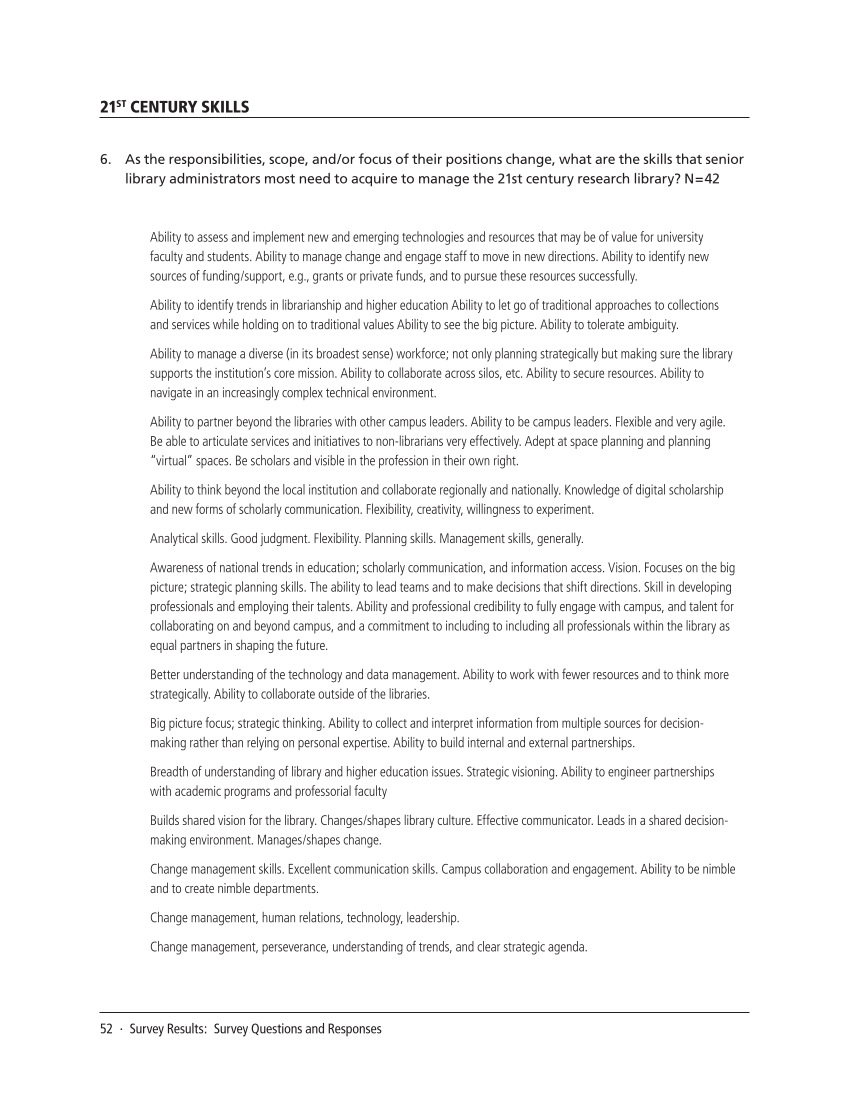52 · Survey Results: Survey Questions and Responses
21st Century Skills
6. As the responsibilities, scope, and/or focus of their positions change, what are the skills that senior
library administrators most need to acquire to manage the 21st century research library? N=42
Ability to assess and implement new and emerging technologies and resources that may be of value for university
faculty and students. Ability to manage change and engage staff to move in new directions. Ability to identify new
sources of funding/support, e.g., grants or private funds, and to pursue these resources successfully.
Ability to identify trends in librarianship and higher education Ability to let go of traditional approaches to collections
and services while holding on to traditional values Ability to see the big picture. Ability to tolerate ambiguity.
Ability to manage a diverse (in its broadest sense) workforce not only planning strategically but making sure the library
supports the institution’s core mission. Ability to collaborate across silos, etc. Ability to secure resources. Ability to
navigate in an increasingly complex technical environment.
Ability to partner beyond the libraries with other campus leaders. Ability to be campus leaders. Flexible and very agile.
Be able to articulate services and initiatives to non-librarians very effectively. Adept at space planning and planning
“virtual” spaces. Be scholars and visible in the profession in their own right.
Ability to think beyond the local institution and collaborate regionally and nationally. Knowledge of digital scholarship
and new forms of scholarly communication. Flexibility, creativity, willingness to experiment.
Analytical skills. Good judgment. Flexibility. Planning skills. Management skills, generally.
Awareness of national trends in education scholarly communication, and information access. Vision. Focuses on the big
picture strategic planning skills. The ability to lead teams and to make decisions that shift directions. Skill in developing
professionals and employing their talents. Ability and professional credibility to fully engage with campus, and talent for
collaborating on and beyond campus, and a commitment to including to including all professionals within the library as
equal partners in shaping the future.
Better understanding of the technology and data management. Ability to work with fewer resources and to think more
strategically. Ability to collaborate outside of the libraries.
Big picture focus strategic thinking. Ability to collect and interpret information from multiple sources for decision-
making rather than relying on personal expertise. Ability to build internal and external partnerships.
Breadth of understanding of library and higher education issues. Strategic visioning. Ability to engineer partnerships
with academic programs and professorial faculty
Builds shared vision for the library. Changes/shapes library culture. Effective communicator. Leads in a shared decision-
making environment. Manages/shapes change.
Change management skills. Excellent communication skills. Campus collaboration and engagement. Ability to be nimble
and to create nimble departments.
Change management, human relations, technology, leadership.
Change management, perseverance, understanding of trends, and clear strategic agenda.
21st Century Skills
6. As the responsibilities, scope, and/or focus of their positions change, what are the skills that senior
library administrators most need to acquire to manage the 21st century research library? N=42
Ability to assess and implement new and emerging technologies and resources that may be of value for university
faculty and students. Ability to manage change and engage staff to move in new directions. Ability to identify new
sources of funding/support, e.g., grants or private funds, and to pursue these resources successfully.
Ability to identify trends in librarianship and higher education Ability to let go of traditional approaches to collections
and services while holding on to traditional values Ability to see the big picture. Ability to tolerate ambiguity.
Ability to manage a diverse (in its broadest sense) workforce not only planning strategically but making sure the library
supports the institution’s core mission. Ability to collaborate across silos, etc. Ability to secure resources. Ability to
navigate in an increasingly complex technical environment.
Ability to partner beyond the libraries with other campus leaders. Ability to be campus leaders. Flexible and very agile.
Be able to articulate services and initiatives to non-librarians very effectively. Adept at space planning and planning
“virtual” spaces. Be scholars and visible in the profession in their own right.
Ability to think beyond the local institution and collaborate regionally and nationally. Knowledge of digital scholarship
and new forms of scholarly communication. Flexibility, creativity, willingness to experiment.
Analytical skills. Good judgment. Flexibility. Planning skills. Management skills, generally.
Awareness of national trends in education scholarly communication, and information access. Vision. Focuses on the big
picture strategic planning skills. The ability to lead teams and to make decisions that shift directions. Skill in developing
professionals and employing their talents. Ability and professional credibility to fully engage with campus, and talent for
collaborating on and beyond campus, and a commitment to including to including all professionals within the library as
equal partners in shaping the future.
Better understanding of the technology and data management. Ability to work with fewer resources and to think more
strategically. Ability to collaborate outside of the libraries.
Big picture focus strategic thinking. Ability to collect and interpret information from multiple sources for decision-
making rather than relying on personal expertise. Ability to build internal and external partnerships.
Breadth of understanding of library and higher education issues. Strategic visioning. Ability to engineer partnerships
with academic programs and professorial faculty
Builds shared vision for the library. Changes/shapes library culture. Effective communicator. Leads in a shared decision-
making environment. Manages/shapes change.
Change management skills. Excellent communication skills. Campus collaboration and engagement. Ability to be nimble
and to create nimble departments.
Change management, human relations, technology, leadership.
Change management, perseverance, understanding of trends, and clear strategic agenda.














































































































































































